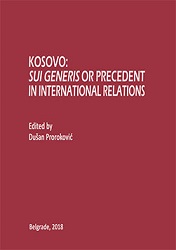KOSOVO: ‘UNIQUE’ CASES, UNILATERAL ACTIONS AND UNINTENDED CONSEQUENCES
KOSOVO: ‘UNIQUE’ CASES, UNILATERAL ACTIONS AND UNINTENDED CONSEQUENCES
Author(s): Gordon N. Bardos
Subject(s): Law, Constitution, Jurisprudence, International Law, Human Rights and Humanitarian Law
Published by: Институт за међународну политику и привреду
Keywords: Kosovo; Great powers; Balkans; Unique case; sui generis; international law; international relations
Summary/Abstract: The above analysis has several important implications. Perhaps the most important is the illumination of the fallacy that the position of Washington, London, or Moscow on the Kosovo issue can be reduced to a dispute over abstract points of international law. As most parties involved know but will not openly admit, the Kosovo case is about much, much more than Kosovo independence. Thus, in order to understand what international law can and cannot teach us about this particular problem, and what international and regional organizations can and cannot do about such problems, it is first necessary to understand the motivation and behavior of great powers in such conflicts. Viewed through this lens, many of the arguments in favor of Kosovo independence sustained by the claim that it is a “unique case” become significantly weaker. In the contemporary world there is of course nothing unique about a region or territory aspiring to gain independence from a larger entity or state; Catalonia, Chechnya, the Kurds in Turkey and Iraq, the Palestinians and Israel, Scotland and South Sudan provide just a few examples. Nor is there anything unique about a government using repressive or violent measures to suppress such struggles, as many of the aforementioned cases reveal. As Sumantra Bose has argued, Kosovo is not a unique case, it is a unique solution.
Book: KOSOVO : sui generis or precedent in international relations
- Page Range: 79-88
- Page Count: 10
- Publication Year: 2018
- Language: English
- Content File-PDF

